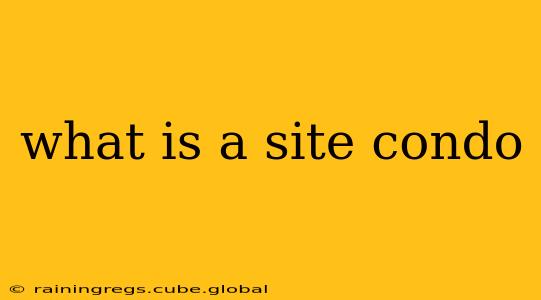A site condo, also known as a condominium on land, represents a unique form of real estate ownership. Unlike traditional condominiums where ownership is limited to the unit itself, a site condo grants ownership of both the building unit and a specific parcel of land. This means you own not just your dwelling, but also the land beneath it. This ownership model blends aspects of traditional homeownership with the conveniences often associated with condo living.
This guide will delve deeper into what defines a site condo, exploring its benefits, drawbacks, and answering frequently asked questions surrounding this increasingly popular housing option.
What are the Key Differences Between a Site Condo and a Regular Condo?
The core difference lies in land ownership. In a standard condominium, you own your individual unit but share ownership of the common areas (like hallways, parking lots, and recreational facilities) with other unit owners. The land itself is typically owned by the condo corporation or association. In a site condo, however, you own your unit and the land underneath it, giving you a more traditional freehold ownership experience. This grants more control over your property and its surroundings.
What are the Benefits of Owning a Site Condo?
-
Land Ownership: The most significant advantage is the ownership of the land itself. This provides a greater sense of security and control, as you are not subject to the decisions of a larger condo corporation concerning land use.
-
Increased Property Value: Because you own the land, the potential for appreciation tends to be higher compared to traditional condos. This is especially true in areas with appreciating land values.
-
Greater Privacy: Site condos often have more space and privacy, typically less densely packed than traditional condo developments.
-
More Customization Options: As the landowner, you generally have more freedom to customize your property and landscaping, subject to any relevant bylaws or local regulations.
-
Potential for Future Development: Depending on zoning regulations, you might have the opportunity to expand your property or even build additional structures in the future.
What are the Drawbacks of Owning a Site Condo?
-
Higher Purchase Price: Site condos typically command a higher purchase price than comparable traditional condos due to the inclusion of land ownership.
-
Increased Responsibility: With land ownership comes increased responsibility for maintenance and upkeep, including landscaping, snow removal, and property taxes on the land itself.
-
Potential for Higher Property Taxes: You will pay property taxes on both the building and the land, leading to higher overall property taxes compared to a traditional condo.
-
Limited Amenities: Site condo developments might offer fewer shared amenities than larger condo complexes.
-
Potential for HOA Fees: While you own the land, there might still be homeowners association (HOA) fees for the maintenance of common areas within the development.
How Does Financing a Site Condo Differ from Financing a Regular Condo?
Financing a site condo is generally similar to financing a traditional home, with lenders considering both the building and land values when assessing your mortgage application. However, obtaining financing might require a more thorough appraisal process due to the unique nature of the ownership.
What are the Legal Aspects of Owning a Site Condo?
Site condo ownership is governed by provincial/state laws and bylaws specific to the development. It is crucial to carefully review all legal documents and understand the terms and conditions of ownership before purchasing.
What are the Insurance Considerations for Site Condo Owners?
Insurance coverage will need to cover both the building and the land. It's vital to have adequate insurance protection against potential damages, losses, and liability. Consult with an insurance professional to ensure appropriate coverage.
This comprehensive overview provides a foundational understanding of site condos. Remember to conduct thorough research and seek professional advice from real estate agents, lawyers, and financial advisors before making a purchase decision. The unique features of site condo ownership require careful consideration of both the benefits and potential challenges.
